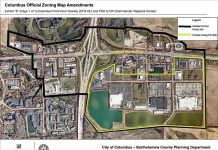INDIANAPOLIS — Reps. Ryan Lauer, R-Columbus, and Jim Lucas, R-Seymour, have voted in favor of a proposal that would severely limit workplace COVID-19 vaccination requirements even as the bill faces resistance from Gov. Eric Holcomb and GOP state senate leaders.
The Republican-dominated Indiana House voted 58-35 Tuesday largely along party lines in favor of the measure, HB 1001, sending it to the Senate for consideration.
However, Rep. J. Michael Davisson, R-Salem, who is challenging Lucas in the GOP primary for House District 69, was one of seven Republicans who voted against the bill.
The vote came after the U.S. Supreme Court’s decision last week to block the Biden administration’s attempt to require COVID-19 vaccinations or testing for workers at big companies. The court, however, let stand a federal vaccination requirement for most health-care workers, so Indiana hospital systems, such as Columbus Regional Hospital, with vaccine mandates wouldn’t be affected by the proposed state law.
The vote also came as hospitals across the state, including CRH, are at their most overwhelmed point of the pandemic as officials struggle to handle a flood of patients amid a wave of coronavirus infections. On Tuesday, CRH reported a record 69 COVID-19 hospitalizations.
Supporters maintain the bill would protect individual rights by forcing employers to grant exemptions to workers who claim medical or religious objections and limit them to requiring COVID-19 tests no more than once a week. It also requires businesses to accept as a vaccine exemption a worker’s medical test results showing some level of immunity through a previous infection and makes anyone fired for not getting a COVID-19 vaccination eligible for unemployment benefits.
Major business organizations argued against the proposed vaccination exemptions, which employers would have to accept from workers “without further inquiry.”
Holcomb and top Senate leaders have opposed the bill as wrongly interfering in the decisions of private businesses, according to wire reports. The Senate is advancing a bill limited to administrative steps Holcomb says are needed to end his statewide COVID-19 public health emergency by allowing the state to keep receiving enhanced federal funding for Medicaid and food assistance programs.
Those steps are included in the House bill, but House Republicans have pushed the vaccination mandate limits in response to conservative grievances over government-ordered virus precautions.
Lauer, who is a co-author of the bill, said HB1001 aims to protect Hoosier workers from federal COVID-19 vaccine mandates and would ensure that individual workers can claim religious or medical exemption to a vaccine requirement by an employer.
“I don’t think (your vaccination status) is any business of your employer, honestly,” Lauer said.
“Nobody should be faced with losing their job or making any medical decision that they or their doctor doesn’t feel is right for them, and who’s the government to decide what’s right for a person’s medical health?,” he said.
When asked why now is a good time to end the public health emergency, Lauer said: “Because it’s time.”
“I mean, we’re (at), what, 700 days (in the state of emergency)?” Lauer said. “That’s not an emergency. …I think that we have the infrastructure, we have vaccines freely available, we have testing freely available. I think Hoosiers understand how to navigate through this time with COVID-19. My belief is that it doesn’t fit the definition of emergency being two years in an emergency. We can continue to protect the public. We can continue to do what needs to be done and not need to be in an official state of emergency.”
However, Lauer said, “I recognize there are various opinions on this (bill).”
Lucas has suggested in Facebook comments that nearly all positive COVID-19 test results in Indiana are “false positives,” touted a drug used to deworm horses as a coronavirus remedy, questioned the effectiveness of vaccines and protested mask mandates.
This past May, Lucas shared a link on Facebook to a pack of blank COVID-19 vaccination cards, writing, “For those of you in the healthcare industry that may need these. For officials use only!”
Lucas later told The Indianapolis Star that “I put this up to show how easy it is to bypass the insanity and even intentionally put a disclaimer at the end…”
However, HB1001 could face some hurdles in the Senate.
Sen. Greg Walker, R-Columbus, said last month that he feels that state legislators should avoid rushing a bill with that language through the General Assembly.
“I think employers locally and across the state are very concerned that we may have one set of vaccination rules to satisfy federal definitions and then a separate or a different set of rules to satisfy state definitions. It becomes very complicated on their part,” Walker said.
Walker said one part of the bill that has concerned some employers is a provision that would allow workers who have been fired for refusing to get vaccinated to collect unemployment benefits.
Additionally, Walker said consumers “may have a strong interest in a vaccinated workforce” in certain high-risk environments, including healthcare settings, and that the U.S. Constitution doesn’t include a “right that you get to work for whoever you want to work for.”
Another point of contention is the religious exemption. Under HB 1001, if a company has a mandate, the proposed bill would require religious exemptions to be honored.
Lauer said, “there’s no religious test” under HB 1001, adding that the government is not capable of evaluating whether people truly hold those beliefs and “employers don’t want to be in that position either.”
Walker said what constitutes “a heartfelt religious belief” is currently “ambiguous.”
“I think we need to be careful on how much we put it on the employer to try to make that determination, (and) how much we just declare that it cannot be challenged in any way,” Walker said.
“I’ve been looking for explanations about those religious convictions myself, and I’m not aware of too many major religions that have declared that that’s the case, but regardless, one’s faith is a personal matter,” Walker added. “I think we need to walk very carefully when we’re trying to do (this) by statute.”
Walker said the General Assembly may end up considering some elements of the bill without considering all of it or amending the bill or a companion bill could be introduced that has certain components of HB 1001 that would relieve the governor of using executive order to extend the public health emergency.
The fast-spreading omicron variant has pushed Indiana’s number of confirmed COVID-19 infections to an average of nearly 14,000 a day, according to state health department tracking. That is the highest level during the pandemic as Indiana’s hospitals were treating almost 3,400 COVID-19 patients as of Monday.
The state has averaged more than 50 such deaths a day since mid-December, and the pandemic death total has reached almost 20,400, including 213 in Bartholomew County.
Bartholomew County’s vaccination rate has stagnated for months despite pleas from Holcomb, medical groups and local officials for more people to get the shots.
Indiana has the country’s ninth lowest rate for a fully vaccinated population at 52.6%, according to the Centers for Disease Control and Prevention.
The Associated Press contributed to this report.





